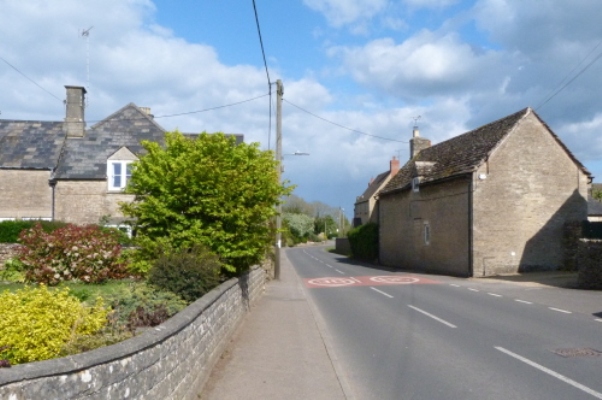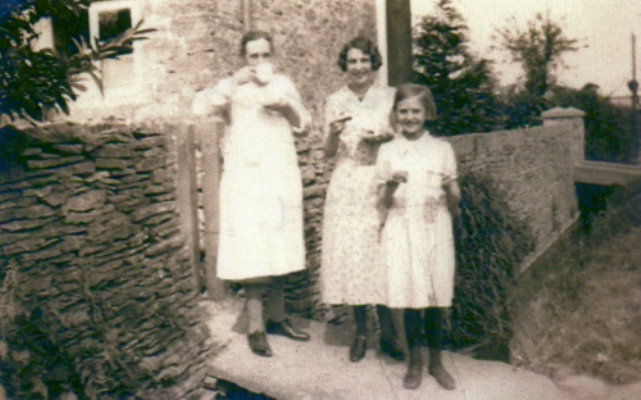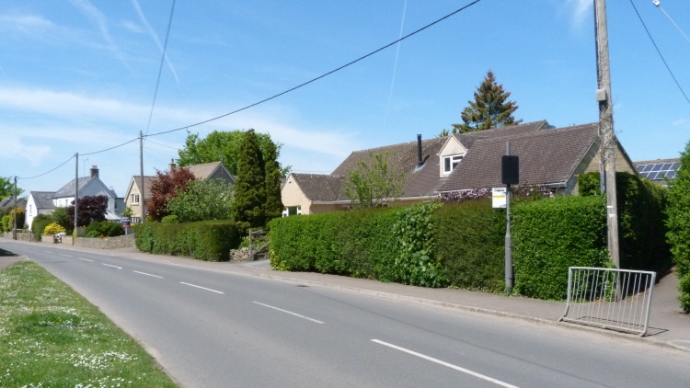Cerney's House with No Name
Part I.
Sue Crossley remembers her grandparents' cottage.
My grandfather, Charles Timbrell, and his wife, Mabel, lived in Station Road from their marriage before the first World War until my grandmother's death in 1966. Charles originally trained as a wheelwright and later a carpenter and builder. By the time of his retirement, sadly very shortly before he died in 1956, he was Clerk of Works to Cirencester District Council.
Mabel was originally from Devonport and moved to Gloucestershire as a young woman to take up a teaching position at Oaksey and later at South Cerney at the time when Mr. Peyman was the schoolmaster.
My uncle Raymond was born in 1920 and my mother, Joan, in 1922.
My grandparents' cottage had no name - the address was simply 'Mr. and Mrs. Timbrell, Station Road' (it's now known as Dryft Cottage). The original cottage was tiny and built of stone with thick walls (although later additions were pebbledashed) and had a large garden which ran parallel with Station Road as far as Butlers Court.

There was one room downstairs, a spiral staircase leading to the bedroom and a small second bedroom. A scullery was attached to the main room which was always called the kitchen, and an outside toilet. There was no hot water in the scullery - my grandmother didn't see the need for it.
Before I was born, my grandfather installed a pump in the well in front of the house to pump water into the scullery so that it was no longer necessary to use a bucket and wind the water up.
Building 'The Penthouse'
My grandfather built an extension when my mother and uncle were children which gave an additional two bedrooms and bathroom upstairs, and a sitting room downstairs which was always freezing cold and only used on special occasions!
There was also a room off the hallway, which we called 'The Penthouse', built for my mother who spent several years as an invalid in her teens and was supposed to have as much fresh air as possible. At that time it only had a roof, the outer walls and door being added later and I remember it being used as a store room for the apples from the orchard and it had a large safe for meat and cheese.
An outhouse - with hot water! - was added to the left of the kitchen facing up towards the village. This was where the washing was done. An enamel bucket was kept in the scullery and taken to the outhouse to fetch hot water for the washing up.
My grandfather was a keen gardener and there was an orchard, large herbaceous borders and a greenhouse heated with an outside fire which was an endless fascination to me as a child. I adored my grandfather and spent many hours with him in the garden - digging for worms, with a cocoa tin and an old fork, to feed the chickens at the end of the garden and 'helping' with whatever he was doing. Halfway down the garden was 'The Palace' - my grandfather's workshop which was his bolt hole! It was deep in sawdust and cobwebs and a magical playground.
During the war my grandparents took in evacuees, having two spare bedrooms with my uncle away serving in the army. As my grandmother's family were from the Plymouth area where bombing was severe, she and my grandfather took two small children who were neighbours of one of her sisters. The youngest, Doreen, was only five years old and spent the next five years with my family. She has remained a very dear family friend ever since and, by chance, now lives in Winchester very close to my own home in Romsey.
Fishing from the Drock
During my childhood in the 1950s and early 1960s there was a ditch running the length of Station Road and we spent many hours with a jam jar fishing for 'tiddlers' from the drock.
When playing ball in the garden, the ball often went through or over the hedge so we had to rush outside to retrieve it from the ditch before it disappeared down towards the station where the water went underground.
The gateway and the drock had been widened when I knew the cottage to enable my grandfather to drive his car over the ditch - not always successfully as he went over the edge on more than one occasion! I think the ditch water was piped and covered in when the lorries from Bradley's got bigger and the road needed widening.

A great excitement to my brother and me was sitting on the garden wall overlooking the ditch waiting for the cows to go past. Mr. Webb would drive them from fields near the station up Station Road to the farm for milking and later they would all go back again. My brother and I would take turns looking out for the cows and with an excited shout 'They're coming!' we would both sit on the gatepost waiting for them to go past, usually with our dog beside us.
Opposite the cottage was Mrs. Trotman's (now Fox Cottage). There were no windows in the wall facing the road as that was the dairy which was part of the house. Mrs. Trotman lived with her adult son Billy who I think had learning difficulties. As far as I remember he never spoke and would hide behind the runner beans in their garden watching what was going on.
When I knew Mrs. Trotman she had about six Jersey cows which lived in her field just down the road (where Kingfisher Place now stands). I would go across the road with a jug for milk, or she would bring one over to the house, putting it through the scullery window onto the marble shelf.
My grandmother refused to have a fridge and the milk would stand on this shelf to keep cool. In summer, at the end of the day, the milk would be heated slowly and the cream scooped off. This way the milk was supposed to keep longer and the cream was eaten for breakfast the following morning. I never liked the taste of the skimmed, cooled milk.
Grampy Timbrell's Field
Between the end of my grandparents' garden and Butlers Court there was a wide, grassy entrance known as the Lannet which led from Station Road to a field behind (today a public footpath to The Lennards). This field was always called Grampy Timbrell's Field where we would pick buttercups and where my mother, uncle Ray and the three Painter sisters (Oonagh, Barbara and Betty) from Ashton Keynes often played cricket as children. I remember cattle grazing there, too.
After my grandfather died, my grandmother took in lodgers for a short time - officers from the RAF station - but I don't remember that being for very long. Nan was a very independent lady and I can't imagine having strangers in the house went down very well. I don't think there was any direct association with the RAF but I know she looked after some Commonwealth War Graves in the churchyard. These were of young airmen killed in the war and their families were not local. These graves were near the wall on the right going into the churchyard.
Uncle Ray and his family moved into the cottage and made substantial alterations following my grandmother's death in 1966, eventually moving back to Cirencester. It was at this time that some of the garden, including the chicken run, was sold and two bungalows built.
Further houses followed and I understand there is now a housing development (The Lennards) covering Grampy Timbrell's Field.
Part II.
Doreen Ayling recalls her time as an evacuee.
My brother and I were taken in by Mabel and Charles Timbrell as evacuees during the war coming from Plymouth when the bombing was at its height, as our next-door neighbour was Mrs. Timbrell's sister. My brother stayed only about two years as he sat the Plymouth eleven-plus, and having passed, returned home to go to Devonport High School for boys. I was aged five when I arrived at South Cerney and 10 when I left. They were, of course, formative years for me, and I look back on those days with great affection and fond memories.
I attended the village school which was then under the headmastership of Mr. Peyman. My teacher was Miss Dunne who was kind and strict - a good combination. I recall that every morning, the Headmaster's monitor would come to each class to collect the numbers of pupils in attendance. These numbers were given as, for instance, 15 girls, 10 boys and three 'vacuees'. It was some time before I understood why I was neither boy nor girl, but some strange species called a 'vacuee'. Having said that, we were not singled out in any way but treated exactly the same as the other children. The village was a very friendly one, and I soon learned the names of many of the inhabitants.
Daffodils for the Neighbours
I called Mr. and Mrs. Timbrell Auntie Mabel and Uncle Charlie. They had a large garden, the produce from which made them largely self-sufficient. Uncle Charlie spent many hours cultivating a variety of vegetables, fruit trees and flowers, and of course, there were chickens at the bottom of the garden. One large area under the Beauty of Bath apple tree was reserved for daffodils which grew in profusion. Uncle Charlie would pick large bunches of them which I was asked to take as gifts to various neighbours.

to the footpath (right) then known as the Lannet
With fresh milk from Mrs. Trotman's Jersey cow across the road, we were well provided for. Only meat was lacking, and this was bought from Mr. Mates, the village butcher whose shop was beside the bridge near Bow Wow. Mr. Dorling ran the village shop and Miss Lane the little sweet shop.
We walked to school from the bottom of Station Road, across 'The Piece' and past the church. Once a year, all the children in the school went to pick rose hips which were, I take it, sold for rose hip syrup.
On Sundays we attended Matins at All Hallows (the vicar I think was the Rev'd. Kennon) and were questioned about the sermon when we returned home. On Sunday afternoons we attended Sunday School which was run by Miss Hall who was a gifted water-colourist. This took place in the Village Hall. Sometimes on Sunday afternoons, Mrs. Timbrell's friends, the Painter family, rode by bicycle from Ashton Keynes to visit. There were three very attractive daughters.
Bottled Plums for Tea
Often an impromptu cricket match took place in the field behind the house which was referred to as Grandpa Timbrell's field. On other Sundays, Mrs. Timbrell's sister, her husband and son would come from Cirencester. I remember that tea usually consisted of bottled plums from the garden.
Leaving Cerney was a huge wrench for me. My parents brought us from Plymouth in the first instance to see us settled in, but as I recall, only visited once more during my stay. Rail travel was very difficult during the war, added to which my two eldest brothers were flying with the RAF and never knew when they would be granted leave. My mother and father would, of course, need to be in Plymouth should 'the boys' come home.
Naturally I grew away from the urban life of Plymouth and was extremely homesick for some time. Auntie Mabel kindly invited me to stay during my school holidays - even providing my train tickets for the journeys. I continued to visit until my marriage, and brought my little daughters to Cerney in 1965.
South Cerney is still a very special place for me and I shall always be grateful for the happy years I spent there.
